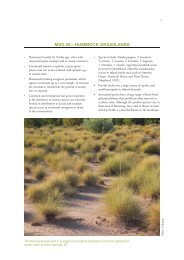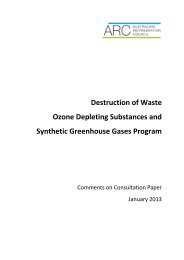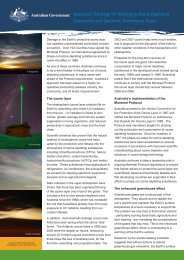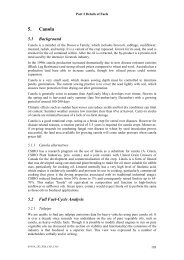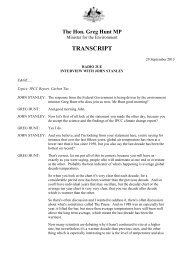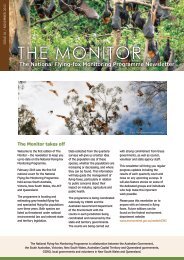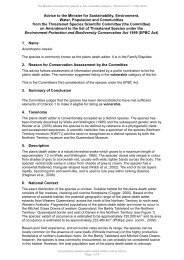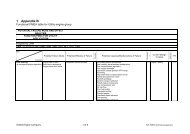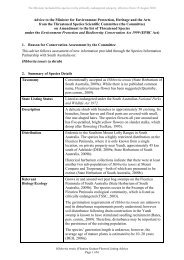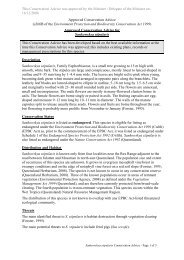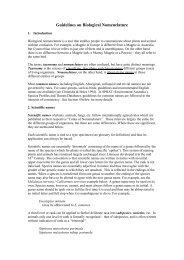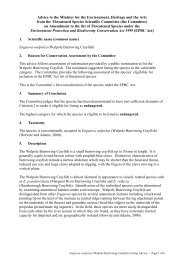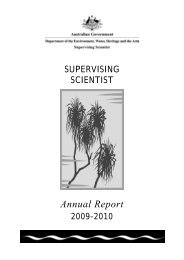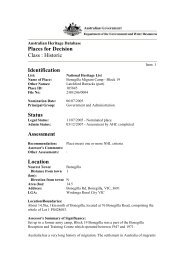WEST KIMBERLEY PLACE REPORT - Department of Sustainability ...
WEST KIMBERLEY PLACE REPORT - Department of Sustainability ...
WEST KIMBERLEY PLACE REPORT - Department of Sustainability ...
Create successful ePaper yourself
Turn your PDF publications into a flip-book with our unique Google optimized e-Paper software.
In 1965, award wages were granted to Aboriginal pastoral workers who were<br />
members <strong>of</strong> the Australian Workers Union. The Kimberley, however, was exempt<br />
from the award on the ground that workers there were mostly 'full bloods', without the<br />
capacity to manage money, and that the introduction <strong>of</strong> an award would likely result<br />
in mass dismissal (Jebb 2002; Sharp and Tatz 1966). Equal wages regulations were<br />
not applied in the Kimberley until 1972, when legislation brought the whole <strong>of</strong><br />
Western Australia into line with the Commonwealth.<br />
In the period following the 1967 referendum, the majority <strong>of</strong> Kimberley missions<br />
were closed either by the relevant government revoking the reserve, or the missionary<br />
body leaving for a variety <strong>of</strong> reasons. Titles were <strong>of</strong>ten handed over to Aboriginal<br />
communities to run via governing bodies such as Community Councils. Many<br />
contemporary Aboriginal people are still affiliated with a range <strong>of</strong> churches and<br />
missions and some are involved in the management <strong>of</strong> these sites.<br />
Equal wages, combined with other factors including government payments and new<br />
work practices in the pastoral industry, led to an exodus <strong>of</strong> Aboriginal people from<br />
stations into towns in the late 1960s and early 1970s. But many who left regarded<br />
their departure as temporary – as 'waiting' to get their country back rather than being<br />
'stuck' on a town reserve (Jebb 2002). For some people the wait was not long. In 1972<br />
the Commonwealth Government purchased the remote Panter Downs station lease on<br />
behalf <strong>of</strong> the Mowanjum community who renamed the station 'Pantijan'. Pantijan<br />
became a major stock and horse training station for young Worrorra and Ngarinyin<br />
people, and was also used as a camp to 'dry out' people with alcohol problems (KLC<br />
2004).<br />
In the same year, the Commonwealth Government also overturned the White<br />
Australia policy and introduced universal visa and citizenship systems. This rejection<br />
<strong>of</strong> the longstanding policy was further reinforced by the enactment <strong>of</strong> the Racial<br />
Discrimination Act 1975 (Tavan 2005). The exemption <strong>of</strong> Asian labourers in the<br />
pearling industry from the White Australia policy appears not to have played any part<br />
in the policy's gradual dismantling. Its cessation reflected changing opinions in<br />
Australia and internationally, and was influenced by a wide range <strong>of</strong> factors. These<br />
included the diminution <strong>of</strong> the British Empire following the Second World War,<br />
lobbying by Australia's Asian neighbours, and greater contact between many<br />
Australian citizens and Asian students during the 1950s. Moral concerns were raised<br />
by church and other groups in Australia over injustices relating to Asian war brides.<br />
Individual cases relating to migration, deportation and citizenship also had an<br />
influence, as did the movement for Aboriginal rights, the radicalisation <strong>of</strong> young<br />
people during the Vietnam War, and the need to seek Asian markets after the United<br />
Kingdom joined the European Economic Community in 1971. The eventual end <strong>of</strong><br />
the policy in 1972 was the result <strong>of</strong> a complex intermingling <strong>of</strong> international politics,<br />
economic transitions, and changes in individual perceptions (Tavan 2005).<br />
Noonkanbah<br />
In 1976, Noonkanbah station lease was purchased by the Commonwealth Government<br />
and handed to the Yungngora Aboriginal Association. Within two years <strong>of</strong><br />
Noonkanbah's return to Aboriginal people, 497 resource exploration claims held by<br />
about thirty companies or prospectors, covering a total <strong>of</strong> nearly 60,000 hectares<br />
(about 35 per cent <strong>of</strong> the station area) had been filed (Allbrook 2009). In 1978, the<br />
71



